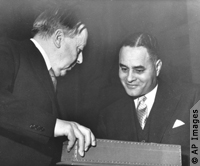DIVERSITY | Offering a place for everyone
29 December 2008
Ralph Johnson Bunche: Scholar and Statesman
African-American diplomat excels as mediator and peacemaker

This article is excerpted from the book Free At Last: The U.S. Civil Rights Movement, published by the Bureau of International Information Programs. View the entire book (PDF, 3.6 MB).
By: Brian Urquhart
A former undersecretary general of the United Nations, Urquhart is the author of Hammarskjöld, A Life in Peace and War, Ralph Bunche: An American Odyssey, and other historical studies.
Even as African Americans fought for their civil rights, their individual accomplishments demonstrated the justice of their cause. The achievements of the Nobel Prize-winning scholar and international official Ralph Bunche demonstrated to all fair-minded people that black Americans could contribute fully to American society.
Ralph Bunche was born in Detroit, Michigan, on August 7, 1903. His father was an itinerant barber, his mother a housewife and amateur pianist. His father abandoned the family, and his mother died when Bunche was 14 years old. From then on he lived in Los Angeles, California, with his maternal grandmother, whose wisdom and strength of character greatly influenced him. He graduated with honors from the University of California at Los Angeles and continued as a graduate student on scholarship at Harvard University.
From his earliest years, Bunche was acutely conscious of racial discrimination and was determined to work against it. His studies of colonial Africa persuaded him that colonialism had much in common with racial discrimination in the United States. He was determined to help put an end to both.
Bunche set up the Political Science Department at Howard University, the historically black university in Washington, D.C. His many articles on racial discrimination later became basic literature for the U.S. civil rights movement. Bunche also pioneered the study of colonialism in the United States. He was the chief associate and co-writer of the Swedish social economist Gunnar Myrdal, whose landmark 1944 study of U.S. race relations, An American Dilemma, was cited approvingly by the U.S. Supreme Court in its Brown v. Board of Education decision.
As the Second World War loomed, Bunche was recruited by the U.S. government to advise on Africa, and then transferred to the State Department to work on the future United Nations charter. He was the first black official in the State Department. At the San Francisco Conference in 1945, he drafted two chapters of the charter, on non-self-governing territories (colonies) and on the trusteeship system. These chapters provided the basis for accelerating decolonization after the war. Bunche did as much as anyone to make decolonization a reality.
In the newly established United Nations, Bunche set up the trusteeship system. His achievements as a member of the U.N. Secretariat were extraordinary. As secretary of the 1947 U.N. Special Commission on Palestine, Bunche wrote the commission’s majority report on partition as well as the minority report on a federal state. The former was adopted by the U.N. General Assembly and remains the basic goal of peacemakers in the Middle East.
In May 1948, the British left Palestine, a Jewish state was declared in that part of mandatory Palestine so designated by the General Assembly, and five Arab states invaded the new state of Israel. The U.N. Security Council appointed a mediator, Count Folke Bernadotte, with Bunche as his chief adviser. They established a truce in Palestine, and Bunche organized a group of U.N. military observers to supervise it, the beginning of U.N. peacekeeping operations. Bernadotte was assassinated by the Stern Gang (an armed, underground Zionist faction condemned by Bunche and by mainstream Zionists) in Jerusalem in September 1948, and Bunche became mediator. In January 1949, he initiated armistice talks, starting with Egypt and Israel. Armistice agreements were concluded between Israel and her four Arab neighbors, providing a formal basis for the cessation of hostilities. In 1950, Bunche won the Nobel Peace Prize for these achievements.
Dag Hammarskjold of Sweden became U.N. Secretary-General in 1953. As an undersecretary-general, Bunche became Hammarskjold’s closest political adviser. In 1956 — after Egyptian nationalization of the Suez Canal — Britain, France, and Israel invaded Egypt in an ill-advised adventure that shocked the world. To get the invaders out of Egypt required something completely new, a U.N. “peace and police force,” as its sponsor, Lester Pearson of Canada, called it. Hammarskjold asked Bunche to raise and deploy this force with minimum delay. Ominous Soviet threats of intervention lent additional urgency. Working around the clock with the enthusiastic support of the United States and many other countries, Bunche assembled and deployed the United Nations Emergency Force in Egypt only eight days after the General Assembly had called for it.
Bunche’s pioneering effort in international peacekeeping was his proudest achievement. He set up and led the 20,000 strong U.N. peacekeeping operation dispatched to the Congo in 1960, and took the lead in forming a similar force in Cyprus in 1964. After Hammarskjold died in an air crash in Africa, Bunche became the indispensable adviser of Hammarskjold’s successor, U Thant of Burma — so indispensable that U Thant’s entreaties prevented Bunche from retiring from the United Nations to immerse himself full time in the civil rights movement. Bunche died, from overwork and the effects of diabetes, on December 9, 1971.
Ralph Bunche cared passionately about getting things done, but very little about getting personal credit. (He even tried to refuse the Nobel Peace Prize.) His great achievements are remembered, but seldom his role in them. African Americans, the millions liberated from the old colonial world, and the United Nations itself are particularly in his debt. He was one of the greatest public servants of the 20th century.